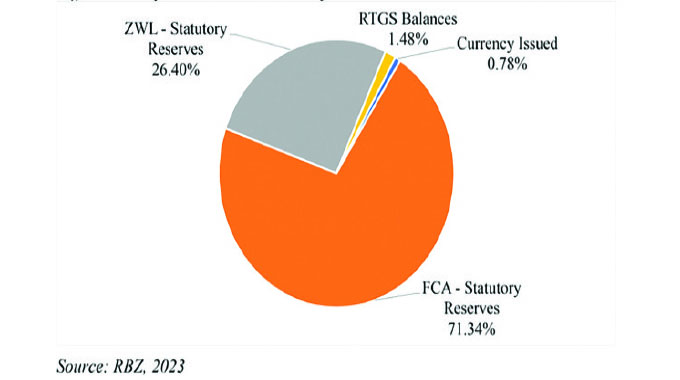Capital markets developments: A journey that never ends


Since the formation of the Securities and Exchange Commission of Zimbabwe in 2009 capital markets regulation has grown
EVERYONE knows the importance of capital markets. How they are particularly important to a country’s long-term financing needs as they help mobilise resources and efficiently direct the flow of savings and investment inside an economy in a manner that facilitates the accumulation of capital and the production of goods and services.
In a similar way, the existence of robust financial markets and institutions also facilitates the international flow of funds between countries.
As Zimbabwe, we are probably not there as yet but everyone agrees that since the formation of the Securities Commission of Zimbabwe (now the Securities and Exchange Commission of Zimbabwe) in 2009, capital markets regulation has grown and there has been tremendous work done to ensure responsibility among market players.
The country had a relatively sophisticated range of financial markets long well before the 1960s (the decade of African Independence). In fact even before the start of the 20th century.
What it lacked was regulation. People kind of made things up as they went along, created their own rules based on the British and South African systems.
The rise of the Stock Exchange in Southern Rhodesia has to be seen within the context of the fact that the primary motive for the colonization of Southern Rhodesia was the hope of finding the “Second Rand”.
This generated immense interest among British and South African mining, development and exploration companies.
However, before these companies could embark on their ventures, they had to raise the necessary capital thus resorted to their domestic stock markets, namely the LSE and the JSE.
Consequently, many Rhodesian companies were listed on either of these two exchanges. The British South Africa Company (BSAC), which led the colonization of Southern Rhodesia was itself listed on the LSE.
Thus by 1892, there were five Rhodesian companies listed on the LSE and seven on the JSE by 1894.
The BSAC actually made it mandatory for all mining companies to list on the LSE. This ensured that mainly large companies established operations in the colony.
This would benefit the Chartered Company, which was entitled to half the profits of these enterprises. The first Stock Exchanges were set up by 1894 in the then Salisbury and Bulawayo.
Five brokers, living in huts in and around Causeway in Salisbury, met and agreed to charge the same brokerage for their services. In the absence of any meaningful capitalist development in the colony, some argued that the move was premature.
However, the proponents of the idea felt that the rapidly expanding economy would soon require an Exchange.
In November 1892, many influential men of Salisbury met to consider the building of an Exchange in the town. However this did not come to fruition until later after the war.
Later, two other exchanges emerged in Gwelo (Gweru) and Umtali (Mutare) around 1898. These exchanges were intended to meet the capital needs of the gold mining industry, whose rapid expansion was fuelled by rumours of a ‘‘Second Rand’’ in the then Southern Rhodesia.
Not surprisingly, by April 1900, there were 91 Rhodesian stocks and shares listed on the London bourse, the majority of which were mining stocks.
The practice of share trading began almost immediately after occupation, with S. Hyman, the first stockbroker, setting up a broking firm in 1891.
The firm acted as an intermediary for settlers who wanted to buy shares on the JSE and LSE. Soon, other broking firms, whose services varied from acting as brokers or financial agents to auctioneers and forwarding agents, emerged.
During this period, the London and Johannesburg exchanges also saw the listing of Rhodesian enterprises seeking to raise capital.
On the whole, these exchanges generated wild speculation in the country, which ended in financial chaos as the hope of the Second Rand faded.
The result was that, as mining companies withdrew, the local stock markets collapsed. By 1902, all the local Exchanges had ceased to operate.
Between 1902 and 1945, public authorities and companies in Southern Rhodesia relied on the London Stock Exchange (LSE) and the Johannesburg Stock Exchange (JSE) for their capital needs. Due to a number of reasons, the main one being the boom in manufacturing during World War Two, the Rhodesian Stock Exchange (RSE) was set up in Bulawayo in 1946.
The exchange which opened in 1946 was the national exchange. The Rhodesia Stock Exchange was born of the need for capital in the manufacturing industry.
The minutes of the meeting to discuss the formation of a Stock Exchange held by Bulawayo businessmen noted that, a stock exchange would prove useful in developing of secondary industries as it is reasonable to expect that a number of such enterprises either in being or about to be commenced would require additional capital to place them on a sound footing and so enable them to compete with overseas competitors.
It would appear, therefore, that this was the single most important reason for the establishment of the RSE. Every member of the RSE had to hold at least four but not more than eight rights.
Non-broker members had to hold at least two but not more than four rights. Similarly, the LSE and JSE had also issued proprietary rights, which had, over time, risen in value. In general, these rights could not be sold to members of the public.
Holders of these rights were entitled to an annual interest, which was determined by the committee and approved at the Annual General Meeting.
The committee also determined the number and value of rights to be issued. On formation, the RSE was made up of about 22 practising and 9 non-practising members.
The Rhodesia Stock Exchange Act reached the statute book in January 1974. The members of the exchange continued to trade as before and for legal reasons it became necessary to create a new exchange coincidental with the passing of the legislation.
The exchange dates from the passing of the act in 1974, and was operated and regulated in accordance with the act and its amendments, including 1996’s Zimbabwe Stock Exchange Act: Chapter 24:18 until the passing of the Securities Act.
The rules and regulations of the RSE followed very closely upon those of the Johannesburg Exchange with only minor modification.
Adopting the JSE rules and regulations meant that the RSE got a fairly comprehensive set of rules and regulations which covered all aspects from members’ rules.
On formation, the RSE was a well-organised Exchange with carefully drafted rules. It did not have to go through the long process of developing its own structures and rules.
The almost wholesale adoption of the JSE’s rules and regulations was in itself a problem. This was because not all the provisions which were suited to the JSE could be applied to the RSE.
By 1963, there were 13 brokers and 98 quoted shares. Treasury bills were first issued in 1952, enabling banks to acquire local liquid assets and providing the government with budget finance, which had previously in foreign bank balances.
With this in place a central bank was set up although the Bank of England thought this was not a clever idea. Immediately after the setting up of the Reserve Bank, two accepting houses were established in 1956 and two discount houses were set up immediately after in 1959.
According to Rhodesia Herald archives, Zimbabwe had developed a viable capital market particularly in government paper and equities.
This according to Charles Harvey’s Banking in Africa: The Impact of Financial Sector since Independence, did not result in financial deepening as measured by the ratio of money supply to GDP. This ratio declined between 1954 and 1963 from 27 percent to 21 percent.
After independence in 1980, Government seemed to give little attention to capital markets. This however does not mean they didn’t know about it.
They did make some promises. In fact promises were made to reform the whole financial services sector and this was included in the economic blueprint: The National Development Fund. A Money and Finance Commission was proposed but sadly never implemented. Some studies have pointed out that Government knew of the economic cost of inappropriate intervention.
The activities of the stock exchange were severely limited so that the number of brokers fell sharply, but the exchange did manage to survive. Until a decade ago, Zimbabwe had next to South Africa the best capital markets on the continent in spite of the absence of a dedicated regulator over the course of the country’s history.
The establishment of the Securities and Exchange Commission of Zimbabwe through the enactment of the Securities Act (Chapter 24:25) has seen easier regulation in the trading and dealing of securities; efficient licencing, and overall the development of free, fair and orderly capital and securities markets in Zimbabwe.
SECZ CEO Mr Tafadzwa Chinamo said: “It has surely been a long road for the country to achieve dedicated market regulation, but we have certainly – and we will continue with that vision to ensure an efficient market.”
This article, written by The Herald Business Editor, appeared in the Securities and Exchange Commission of Zimbabwe’s quarterly news bulletin.








Comments